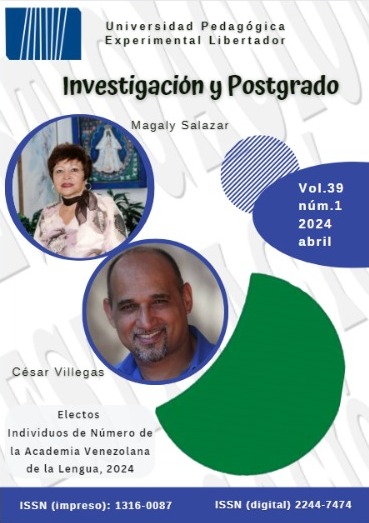TEACHING AND LEARNING PROCESSES IN TIMES OF COMPLEXITY. SUGGESTIONS FROM THE PERSPECTIVE OF MATTHEW LIPMAN
DOI:
https://doi.org/10.56219/investigacinypostgrado.v39i1.2697Keywords:
autonomous learning, complexity, knowledge, meaningful teaching, higher order thinkingAbstract
This research, as a result of a documentary review, analyzes the tangential aspects of the work of Matthew Lipman and his contributions to the teaching and learning processes in times of complexity. Hence, the author is assumed as a reference from which to generate spaces to teach and learn in a timely manner, privileging the development of critical thinking skills that contribute to the understanding of the abundant information that circulates within scientific-academic communities in an attempt to achieve in those who form critical-reflective and analytical attitudes that allow them to learn for themselves as a task equally shared by teaching. In conclusion, teaching and learning in complex time’s demands promoting the operationalization of higher order thinking skills in the educational setting that allow those who are trained to face manipulation, distinguis-hing between what is true and what is not.
Downloads
References
Alves, S. y Maruro, D. (2020). La experiencia de pensar conceptos y filosofar en la infancia según la perspectiva de Matthew Lipman, Revista Childhood y Philosophy, 16(10), 1-36. https://doi.org/10.12957/childphilo.2020.53655 DOI: https://doi.org/10.12957/childphilo.2020.53655
Harada, E. (2012). La filosofía de Matthew Lipman y la educación. Perspectivas desde México. Universidad Autónoma de México.
Lipman, M. (1993). Asombrándose ante el mundo. Ediciones de la Torre.
Lipman, M. (1998). Pensamiento complejo y educación. Ediciones de la Torre.
Lipman, M y Gazard, A. (2001). Poner en orden los pensamientos. Ediciones de la Torre.
Lipman, M. (2002). Matthew Lipman: filosofía y educación. Ediciones de la Torre.
Lipman, M, Sharp, A. y Oscanya, F. (1992). La filosofía en el aula. Madrid: Ediciones de la Torre.
Lipman, M. (2016). El lugar del pensamiento en la educación. Madrid: Octaedro.
Márquez, A. y García, J. (2007). El valor de educar en la filosofía para niños y niñas e Matthew Lipman. Episteme, 27(1), 83-96. http://ve.scielo.org/scielo.php?script=sci_arttext&pid=S0798-43242007000100005
Morales, J. (2021). La lectura como proceso y su relación con el pensamiento y la educación. Acoyauh, 58(58), 60-70.
Morales, J. (2023a). Modos de pensamiento. Un desafío de los procesos de enseñanza-aprendizaje en la actualidad. Dissertare Revista de Investigación en Ciencias Sociales, 7(2), 1-20.
Morales, J. (2023b). Lectura e investigación en Matthew Lipman. Prácticas al servicio del aprendizaje en la educación del siglo XXI. Yachay Revista Científico Cultural, 12(1), 58-64. https://doi. org/10.36881/yachay.v12i1.672. DOI: https://doi.org/10.36881/yachay.v12i1.672
Parra, R. y Medina, J. (2007). La comunidad de investigación y la formación de ciudadanos. Consideraciones a partir del pensamiento de Matthew Lipman y Paulo Freire. Revista Telos, 9(1), 80-89. https://dialnet.unirioja.es/servlet/ articulo?codigo=6436339
Pulido, O. (2019). Filosofía para niños, ciudadanía y experiencia filosófica. Revista Praxis y Saber, 10(23), 9-17. https://doi.org/10.19053/22160159.v10. n23.2019.9738 DOI: https://doi.org/10.19053/22160159.v10.n23.2019.9738
Ruiz, J. (2022). El papel de la experiencia y la formación del profesorado en la filosofía de educación de John Dewey y Matthew Lipman. Revista Internacional de Filosofía Aplicada HASER, 13(13), 81-103. https://revistascientificas.us.es/index.php/HASER/article/view/20775 DOI: https://doi.org/10.12795/HASER/2022.i13.03
Published
How to Cite
Issue
Section
License
Copyright (c) 2024 Investigación y Postgrado

This work is licensed under a Creative Commons Attribution-NonCommercial-ShareAlike 4.0 International License.
Investigación y Postgrado está bajo una licencia internacional Creative Commons Attribution-NonCommercial-ShareAlike 4.0 .
La política de acceso abierto y de licencias con “algunos derechos reservados” no niega la propiedad intelectual ni los derechos de los autores respecto a sus artículos, al contrario, los respeta. Es por ello que:
No se reservan los derechos de publicación de los artículos. Los autores podrán distribuir su artículo en cualquier otro medio, siempre y cuando sea sin fines de lucro. Debe informar al Editor de esta nueva publicación y debe dar el crédito a la revista Investigación y Postgrado.













